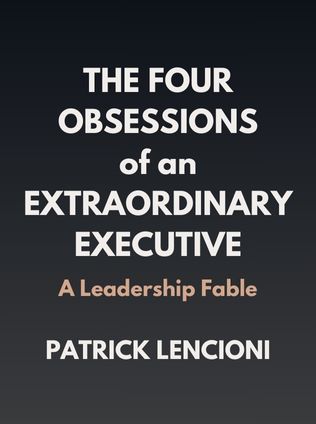
The Four Obsessions of an Extraordinary Executive
A Leadership Fable
By Patrick Lencioni
Published 08/2000
About the Author
Patrick Lencioni, a renowned figure in the realm of business management, is a celebrated author, consultant, and speaker. With a unique approach to leadership and organizational health, Lencioni has authored several bestsellers, including The Five Dysfunctions of a Team, The Advantage, and The Ideal Team Player. His writing is often marked by a combination of practical wisdom and engaging storytelling, which he uses to convey complex ideas in a relatable and understandable manner. Lencioni’s expertise is rooted in his extensive experience working with top executives and organizations across various industries, helping them to improve team dynamics, enhance leadership effectiveness, and ultimately, achieve organizational health.
In The Four Obsessions of an Extraordinary Executive, Lencioni employs his signature style of storytelling to present a business fable that underscores the critical importance of organizational health. This book is a testament to his belief that a healthy organization—one free from politics, with high morale and low turnover—outperforms its competitors. Through the fictional tale of two rival CEOs, Lencioni distills his insights into four actionable steps that any executive can implement to foster a thriving organization.
Main Idea
The central thesis of The Four Obsessions of an Extraordinary Executive is that organizational health is the cornerstone of sustained business success. Lencioni argues that while many executives focus on strategy, finance, and marketing, they often overlook the importance of creating and maintaining a healthy organizational culture. This oversight can lead to a variety of issues, including low employee morale, high turnover rates, and inefficiency.
Lencioni posits that extraordinary executives differentiate themselves by obsessing over four key areas:
- Building a cohesive leadership team
- Creating clarity within the organization
- Over-communicating organizational clarity
- Reinforcing clarity through human systems
These four obsessions, when diligently pursued, lead to a strong organizational foundation where trust, accountability, and alignment flourish, resulting in superior performance and competitive advantage.
The Four Obsessions
1. Building a Cohesive Leadership Team
The first obsession is about forming a cohesive leadership team. Lencioni stresses that the foundation of any successful organization lies in its leadership. A cohesive team is characterized by a high level of trust, open communication, and mutual respect. Leaders must be willing to engage in constructive conflict, hold each other accountable, and commit to decisions, even when they disagree.
Lencioni emphasizes that without trust, a leadership team cannot function effectively. Trust, in this context, means that team members are comfortable being vulnerable with one another, admitting mistakes, and acknowledging their weaknesses. This level of trust allows for open dialogue, where leaders can challenge each other’s ideas without fear of damaging relationships.
“Building trust is not about being soft; it’s about being real. Leaders who trust each other aren’t afraid to engage in passionate debate.” - Patrick Lencioni
To build this trust, Lencioni suggests creating opportunities for team members to share personal stories and experiences. This helps to break down barriers and fosters a deeper understanding and empathy among team members. Additionally, regular team-building activities and off-site meetings can help to strengthen these bonds.
Sign up for FREE and get access to 1,400+ books summaries.
You May Also Like
The Subtle Art of Not Giving a F*ck
A Counterintuitive Approach to Living a Good Life
By Mark MansonRich Dad Poor Dad
What the Rich Teach Their Kids About Money - That the Poor and Middle Class Do Not!
By Robert T. KiyosakiHow To Win Friends and Influence People
The All-Time Classic Manual Of People Skills
By Dale CarnegieQuiet: The Power of Introverts
The Power of Introverts in a World That Can't Stop Talking
By Susan Cain



















